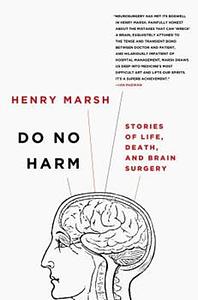Take a photo of a barcode or cover
Each chapter is titled after one specific medical condition and Henry Marsh then tells the story of a patient he has treated with that condition. He is raw and honest in his accounts and does not shy away from admitting his faults and failures. However, he does it in a way that does not undermine his authority as a surgeon, perhaps this is due to the humble and awe-inspiring way he regards his work. He does not try to hide or excuse the conditions the patients are treated under and how the system does not seem to favour them. In fact, he criticises the politics of it all and how the patients should always be put before economical gain several times. Still, this is not the main focus of the book, which I like because it reflects that this is not his main focus; he does not seem interested in the politics but is rather driven by pure passion and wonder. His awe of the human mind and brain is weaved through every part of the book and this is what makes it fascinating to read. He is doing what he loves despite the personal and moral sacrifices he seems to have made and all of the burdens he bears, and that is my ultimate take away.
informative
inspiring
sad
medium-paced
funny
reflective
fast-paced
challenging
dark
emotional
funny
informative
inspiring
reflective
fast-paced
Really gripping read from an angry and rather entitled surgeon. Very quick read
Read for book club, and hard to put down.
A fascinating topic in itself - the brain and all the things that can go wrong. But for me, the real interesting part is how raw and honest this is. It is hard to admit any mistakes in the medical field, but to do so with such catastrophic outcomes is brave.
I think this contrasts so well with Black Box Thinking where Matthew Syed really dives into the airline vs medical fields in terms of best vs worst practice learning from mistakes, but Marsh gives such an interesting look into the human side of it.
The author himself has a few old school views on the world and I’m not sure we’d be pals in real life. But I guess that’s the sort of personality you need to bounce back from failures like these and keep on working.
A fascinating topic in itself - the brain and all the things that can go wrong. But for me, the real interesting part is how raw and honest this is. It is hard to admit any mistakes in the medical field, but to do so with such catastrophic outcomes is brave.
I think this contrasts so well with Black Box Thinking where Matthew Syed really dives into the airline vs medical fields in terms of best vs worst practice learning from mistakes, but Marsh gives such an interesting look into the human side of it.
The author himself has a few old school views on the world and I’m not sure we’d be pals in real life. But I guess that’s the sort of personality you need to bounce back from failures like these and keep on working.
This was an illuminating, easily readable book that explored the complexities of being a neurosurgeon. I didn't realize Marsh had done so much work in Ukraine, so, being half Ukrainian, that was lovely to read about. It was a pensive, yet hopeful, read.
informative
fast-paced
Suggested by @amoflynn when @solennsbooknook asked for books in similar genre to “The Story of a Heart”, this was a great recommendation. We hear from perspective of a renowned neurosurgeon, how he got to where he was at, and he tells stories of individual patients (all anonymous, I assume) that give us insight into the world of neurosurgery.
Being in the medical field this gave me certain insights and things that I hope to continue remembering about interacting with patients.


